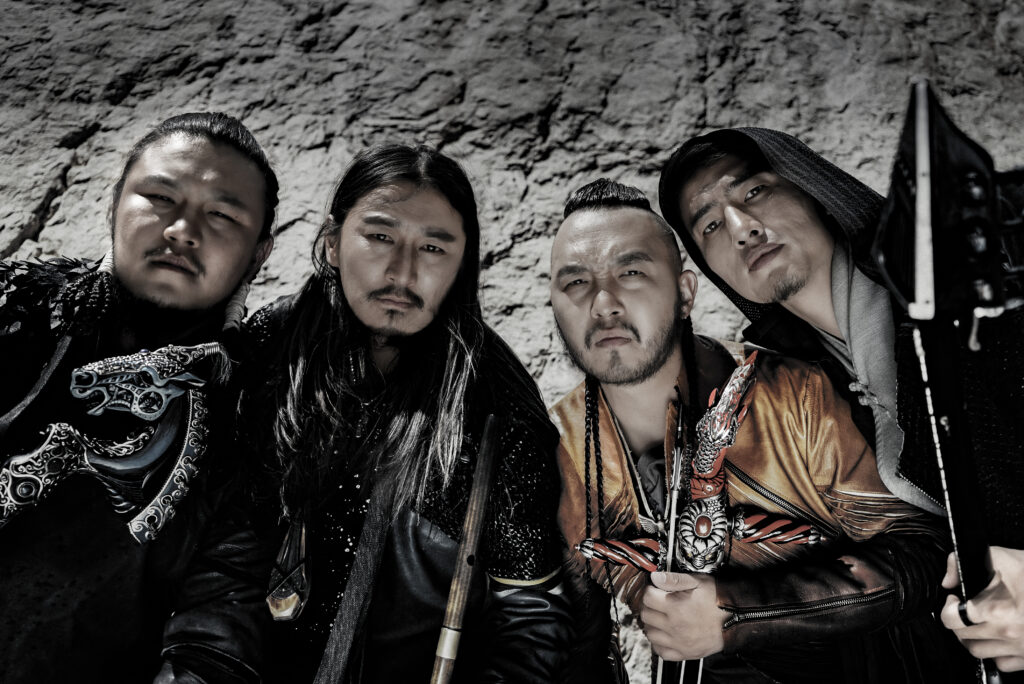THE HU – HU ARE THEY

EVERY ONCE IN A WHILE, AN ARTIST APPEARS ON THE ROCK MUSIC SCENE THAT SOUNDS LIKE NOTHING ELSE GOING ON. They make waves precisely because they go against the grain of the music industry’s conventional wisdom that an act must sound like another currently successful one if they are to have any hope of making it. These past few years, The Hu has been a runaway success story, an incredible group of musicians that took the sound of their native Mongolia and merged it with their love of western hard rock and heavy metal. The Hu simply and refreshingly sounds like nothing and no one else and the world is a better place for it. They are powerful without ever losing their melodic sensibility, hypnotic and pleasing to the soul.
Red Hot Rock Magazine was thrilled to sit down for a quick chat with band members Jaya and Temka together with manager/translator Tuga on their bus just before a promotional performance for the band’s very first album, The Gereg, on a tour that saw loads of sold-out dates in venues packed to the rafters. The Hu has since recorded and released their second album entitled Rumble Of Thunder.
RED HOT ROCK MAGAZINE: First off, I wanted to congratulate you guys on the response you have been getting to your music. Not only have you received a flood of fans viewing your videos online and had your first album charting all over the world, but your shows have been selling out all over the place. We have been to this venue many times, but I do not remember ever seeing a line stretching around the building the way it is tonight.
JAYA: Thank you.
TEMKA: Thank you very much.
RHRM: You are very welcome. I absolutely love your music, but I also like very much the message that winds its way through your material, that everyone should strive to overcome whatever difficulties or adversity they may experience in their lives and become their own sort of warrior. That is very positive and extremely powerful, especially in dark times.
JAYA: Thank you.
RHRM: Your debut album is kind of conceptual in that many or most of the songs reference Genghis Khan in one manner or another and speak of your reverence for his legacy. The intention of The Hu seems to have been stated with the name of the album, The Gereg, which was a sort of diplomatic passport during the days of Genghis Khan. I believe that it was the first of its kind in the world. Now you guys have continued the tradition in your own way by representing your country as cultural ambassadors with your government formally recognizing you as such. Your minister of foreign affairs has honored The Hu with the title Official Mongolian Ambassador To The World. Genghis Khan has attained almost supernatural status through the years, a very cinematic personality. But most of the world remembers him as a brutal warrior that wiped out civilian populations to create his empire. But history is an interesting concept that depends on by whom the story is told. Your aim appears to be to remind and/or educate people that Genghis Khan also was the founding father of your nation, a man who introduced the diplomatic passport to the world, as well as, I believe, a formal and structured postal system and the innovative trading network along the silk road. What is it that you are trying to teach people about Genghis Khan that they may not know?
JAYA: Genghis Khan is considered the founding father of our country just like George Washington here in America. In the world, there are a lot of sides to him. But we wanted to tell our own story. He was a visionary man. He brought so many positive things to the world, as you mentioned – the postal service, international trading and the diplomatic passport, which is our album title. So, our idea is that through our music we can share our story to the world.
RHRM: In addition to the traditional Mongolian instruments that you use, most of you are also throat singers. Throat singing has always amazed me. I love its sound, but I do not understand the technique. I do understand that the human voice has the ability to do more than one thing at a time. Can you please explain a little what is behind this type of vocalization and how it is done?
JAYA: It’s an ancient Mongolian technique that makes two or more sounds using one voice. Our ancestors have been doing it for thousands of years, the people in the Mongol tribes who lived around the Outer mountain region. And Tuva throat singing, too, because they are one of the Mongol tribes. So, this came from human beings trying to connect to nature and imitating nature sounds like water, waterfalls and wind. Because it comes from the deepest level of a human being, and it connects people.
To read the rest of this feature, please order a copy of Red Hot Rock #78 at our online shop.
